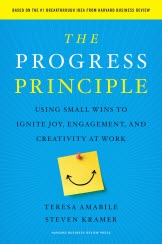Teresa M. Amabile
Edsel Bryant Ford Professor of Business Administration Director of Research
 Teresa Amabile is the Edsel Bryant Ford Professor of Business Administration in the Entrepreneurial Management Unit at Harvard Business School. She is also a Director of Research at the School. Originally educated and employed as a chemist, Dr. Amabile received her Ph.D. in psychology from Stanford University in 1977. Her research investigates how life inside organizations can influence people and their performance. Originally focusing on individual creativity, Dr. Amabile's research expanded to encompass individual productivity, team creativity, and organizational innovation. This 35-year program of research on how the work environment can influence creativity and motivation yielded a theory of creativity and innovation; methods for assessing creativity, motivation, and the work environment; and a set of prescriptions for maintaining and stimulating innovation. Dr. Amabile's current research program focuses on the psychology of everyday work life: how events in the work environment influence subjective experience ("inner work life") and performance (creativity, productivity, and commitment to the work).
Teresa Amabile is the Edsel Bryant Ford Professor of Business Administration in the Entrepreneurial Management Unit at Harvard Business School. She is also a Director of Research at the School. Originally educated and employed as a chemist, Dr. Amabile received her Ph.D. in psychology from Stanford University in 1977. Her research investigates how life inside organizations can influence people and their performance. Originally focusing on individual creativity, Dr. Amabile's research expanded to encompass individual productivity, team creativity, and organizational innovation. This 35-year program of research on how the work environment can influence creativity and motivation yielded a theory of creativity and innovation; methods for assessing creativity, motivation, and the work environment; and a set of prescriptions for maintaining and stimulating innovation. Dr. Amabile's current research program focuses on the psychology of everyday work life: how events in the work environment influence subjective experience ("inner work life") and performance (creativity, productivity, and commitment to the work).- Teresa Amabile draws from her new book The Progress Principle to explain how companies can overcome the "crisis of disengagement" occurring in the workplace.
- By Teresa M. Amabile, and Steven J. Kramer.Harvard Business Review Press, 2011.
 The most effective managers have the ability to build a cadre of employees who have great inner work lives-consistently positive emotions; strong motivation; and favorable perceptions of the organization, their work, and their colleagues. The worst managers undermine inner work life, often unwittingly. As Teresa Amabile and Steven Kramer explain in The Progress Principle, seemingly mundane workday events can make or break employees' inner work lives. But it's forward momentum in meaningful work-progress-that creates the best inner work lives. Through rigorous analysis of nearly 12,000 diary entries provided by 238 employees in seven companies, the authors explain how managers can foster progress and enhance inner work life every day. The book shows how to remove obstacles to progress, including meaningless tasks and toxic relationships. It also explains how to activate two forces that enable progress: 1) catalysts-events that directly facilitate project work, such as clear goals and autonomy and 2) nourishers-interpersonal events that uplift workers, including encouragement and demonstrations of respect and collegiality. Filled with stories from the companies studied, The Progress Principle equips aspiring and seasoned leaders alike with the insights they need to maximize their people's performance.
The most effective managers have the ability to build a cadre of employees who have great inner work lives-consistently positive emotions; strong motivation; and favorable perceptions of the organization, their work, and their colleagues. The worst managers undermine inner work life, often unwittingly. As Teresa Amabile and Steven Kramer explain in The Progress Principle, seemingly mundane workday events can make or break employees' inner work lives. But it's forward momentum in meaningful work-progress-that creates the best inner work lives. Through rigorous analysis of nearly 12,000 diary entries provided by 238 employees in seven companies, the authors explain how managers can foster progress and enhance inner work life every day. The book shows how to remove obstacles to progress, including meaningless tasks and toxic relationships. It also explains how to activate two forces that enable progress: 1) catalysts-events that directly facilitate project work, such as clear goals and autonomy and 2) nourishers-interpersonal events that uplift workers, including encouragement and demonstrations of respect and collegiality. Filled with stories from the companies studied, The Progress Principle equips aspiring and seasoned leaders alike with the insights they need to maximize their people's performance. - Teresa M. Amabile (mailto:tamabile@hbs.edu) is the Edsel Bryant Ford Professor of Business Administration at Harvard Business School and the author of Creativity in Context (Westview Press, 1996). Steven J. Kramer(steve@progressprinciple.com) is an independent researcher, writer, and consultant in Wayland, Massachusetts. He is a coauthor of "Creativity Under the Gun" (HBR August 2002) and "Inner Work Life" (HBR May 2007). Their book, The Progress Principle: Using Small Wins to Ignite Joy, Engagement, and Creativity at Work, is forthcoming from Harvard Business Review Press.
No comments:
Post a Comment